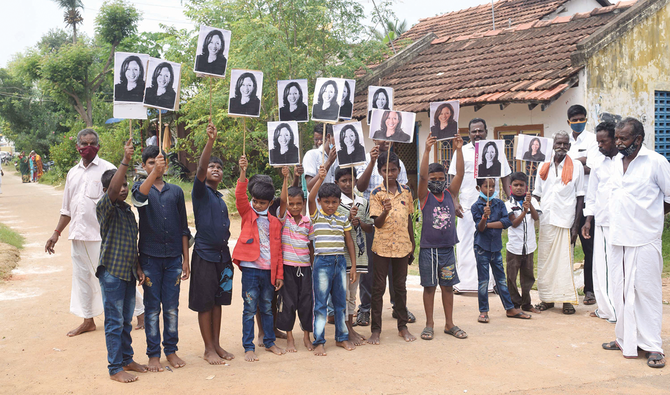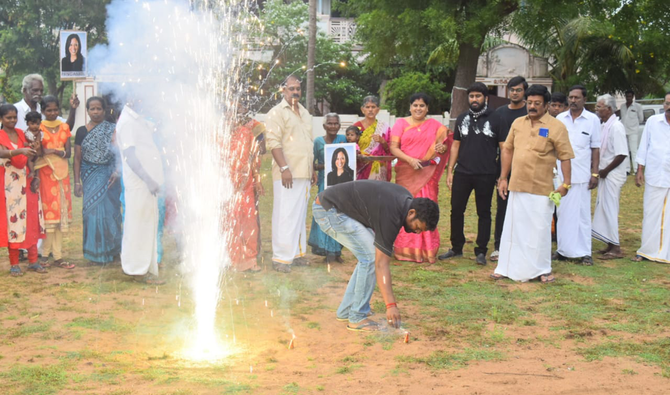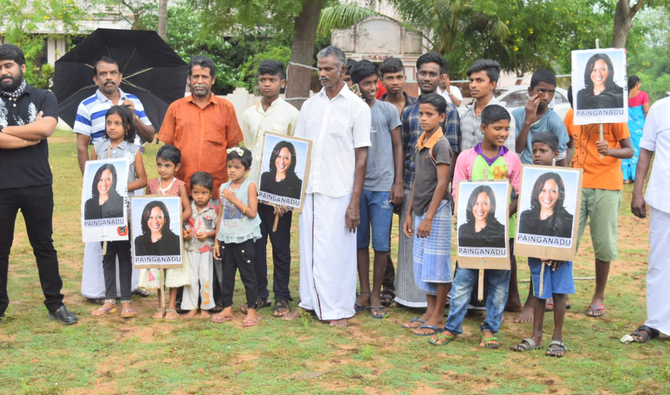NEW DELHI: For three days in a row Arulamozli Sudhakar has been busy making colorful rangoli designs on the floor outside her house, interspersed with words of congratulations to US vice president-elect Kamala Harris.
“We want Harris to visit the village when she becomes the president of the US,” Sudhakar, 31, a local councilor, told Arab News.
Her friend, S. Vijyarani, agreed. “I am sure Kamala Harris is going to be the president of America, and then we would like her to come to the village and meet us,” Vijayarani told Arab News.
The village of Thulasenthirapuram in the Nagapattinam district of the South Indian state of Tamil Nadu has become the center of attention since Saturday.
“Kamala Harris is one who belongs to us, and her achievement fills us with immense pride and a sense of fulfilment,” Sudhakar said.
Half-Jamaican Harris traces her Indian roots to the village, located nearly 350 km from the state capital, Chennai.
It’s the place where her grandfather, P. V. Gopalan, was born and raised before he moved to New Delhi to work with the Indian government in the 1950s.
“It’s celebration time for us. The festival of Deepawali is still a week away, but for us, the celebrations have started early. This is quite a special time for us,” Sudhakar said, talking about the Hindu festival where people decorate their houses with lanterns or diyas to ward off evil.
Thulasenthirapuram, with just 3,000 people, had never taken much interest in American politics before this year.
FASTFACT
The villagers are planning a big celebration when Kamala Harris takes the oath. It will be a grand celebration.
“We were keenly watching the counting in the US. The first day of the counting disappointed us. However, when the postal ballots began to be counted, our hopes went up,” Jayaram Sudhakar, a local civil society activist said.
He told Arab News “the villagers are planning a big celebration when Kamala Harris takes the oath. It will be a grand celebration.”
Despite Harris’ Indian family leaving for opportunities elsewhere, her Chennai-based maternal aunt, Dr. Sarala Gopalan, visits the local temple regularly.
“A few years ago, Kamala Harris also donated 5,000 rupees ($70) to the local temple through her aunt. Her name is prominently inscribed on the temple wall,” Jayaram said.
Local priest S. Ramanan said it did not matter “whether Kamala Harris lives in the village or not. The villagers feel connected and inspired by her roots in the area.”
Outside of Thulasenthirapuram, Indians in other parts of the country reacted to Harris’ win as well.
Women’s rights and political activist Kavita Krishnan said she saw “immense political significance” in President Donald Trump’s defeat.
“It gives us hope that through the proper mobilization of working class and young people we can defeat the majoritarian forces which have taken over the nation,” Krishnan told Arab News.
Yashi Raj, from the University of Delhi, said: “I don’t want to see Harris from the prism of a woman and an Indian; for me she stands out because she stood up against wrong, she spoke against the marginalization of minorities and the suppressed.”
One debate dominating a section of the media and intelligentsia, however, is how the victory result in the US might affect the Hindu right-wing ecosystem in India.
“For India’s right-wing ecosystem, and especially for Hindu fundamentalists, the defeat of Trump is no less than a shock,” Gowhar Geelani, a Kashmiri author and analyst, told Arab News.
“It won’t be easy for them to get away with Islamophobia, demonization and caricaturing of Muslims in India and Kashmir,” the Srinagar-based political commentator added.
Before being elected, both the incoming president, Joe Biden, and his running mate Harris had voiced concerns over the political marginalization of Kashmiris and violence against Indian Muslims elsewhere in the country.
“While the political class, civil society and human rights actors in Jammu and Kashmir are happy that Biden and Harris are now at the helm of affairs in the US, expectations about the immediate relief and conflict resolution is premature,” Geelani said.
He added that the victory of the Democrats would “offer some hope” for Kashmiris.
“It has meant some joy for the people in Kashmir after 15 months of mental and digital siege,” he said.
Delhi-based political analyst Nilanjan Mukhopadhyay agreed, and added that there was “a sense of dismay” among the ruling right-wing forces.
“I am sensing a certain amount of dismay at the result among the right-wing forces,” Mukhopadhyay, who has written a biography on India’s premier, Narendra Modi, told Arab News.
“They fear a strong anti-polarizing discourse in the US would eventually lead to an eclipse of the large number of populist leaders, including Modi. There are worries that it may influence Indian politics,” Mukhopadhyay said.
Dr. Hilal Ahmed of New Delhi-based think-tank, the Centre for the Study of Developing Societies, said that the “electoral victory of the Democrats is significant in a way that it would force the ultra-nationalists all over the world to refashion their political rhetoric.”
However, a ruling Bhartiya Janata Party (BJP) leader called the comparison far-fetched.
“Narendra Modi came to Delhi driven by the power of hope. He represents the aspirations of the people. His continued popularity shows that people don’t see him from the prism of ideology or religion, but the prism of hope,” BJP youth leader Pappu Nirala told Arab News.

















